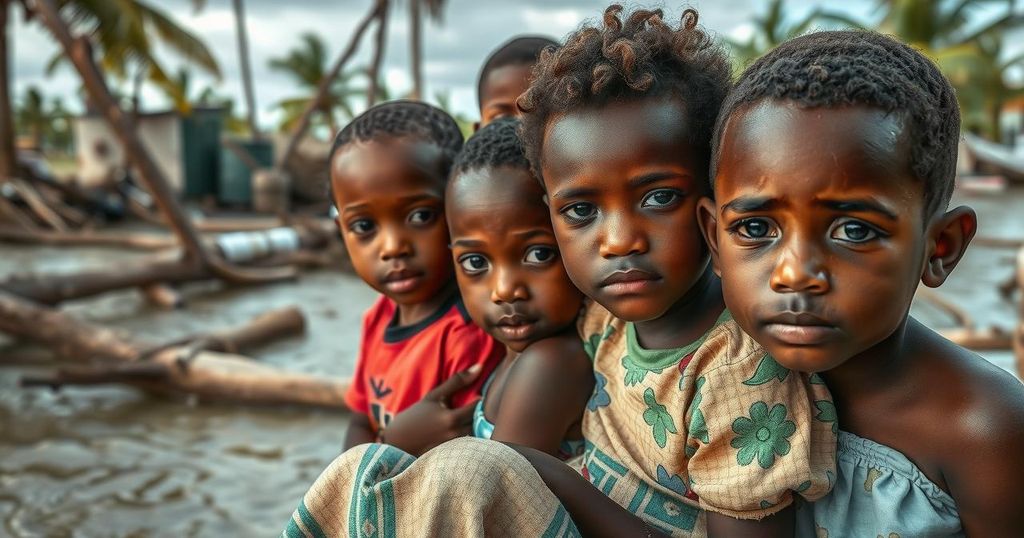Devastation in Mozambique: Cyclone Chido Impacts 90,000 Children
Tropical Cyclone Chido has severely impacted northern Mozambique, affecting around 90,000 children and destroying over 35,000 homes. Overall, approximately 174,000 individuals have been impacted, with extensive infrastructure damage reported. Humanitarian efforts are underway, but challenges persist as the region grapples with ongoing conflicts and existing health crises.
Tropical Cyclone Chido has recently devastated northern Mozambique, particularly impacting Cabo Delgado province. As per reports from UNICEF, approximately 90,000 children have been severely affected by the storm, which has damaged over 35,000 homes and displaced numerous families. Overall, around 174,000 individuals are impacted, and the need for humanitarian assistance is escalating as assessments continue.
The cyclone wreaked havoc on educational and health infrastructure, with at least 186,000 classrooms and 20 health facilities reported as destroyed or harmed. The powerful winds and torrential rains have notably affected regions by Pemba, damaging critical civilian infrastructure, including electricity and communication systems. Mary Louise Eagleton, the UNICEF Representative in Mozambique, emphasized, “Mozambique is considered one of the most affected countries in the world by climate change and children were already experiencing several life-threatening emergencies before Cyclone Chido, including conflict, drought, and disease outbreaks.”
Cabo Delgado has been suffering from prolonged conflict for the past seven years, leading to significant internal displacement, with a substantial number of women and children. The cyclone has introduced further difficulties for those struggling to rebuild their lives. In addition to damaging towns, Cyclone Chido has impacted more than 25,000 families in nearby provinces like Nampula and Niassa, intensifying the existing cholera outbreak crisis.
In light of the situation, humanitarian organizations have begun urgent assistance efforts. Within 48 hours of the cyclone’s impact, the UN refugee agency provided emergency supplies to over 2,600 affected individuals in Pemba. Initial assessments suggest that 190,000 people are in dire need of humanitarian help, with significant impact on local schools and housing. UN Secretary-General António Guterres noted that the UN teams are actively delivering assistance and are prepared to provide additional support as necessary.
However, logistical challenges have emerged, compounded by existing food insecurity issues. Emergency Relief Coordinator Tom Fletcher has allocated $4 million to bolster the response effort, while the World Food Programme plans to increase its support for cyclone-affected communities. The devastation from Cyclone Chido has not only affected Mozambique but also caused significant damage in Mayotte and southern Malawi, necessitating ongoing monitoring and coordinated responses from local and international agencies.
The article discusses the aftermath of Tropical Cyclone Chido, which hit northern Mozambique, particularly affecting Cabo Delgado province. This region has already been struggling with prolonged conflict and food insecurity, making the impact of the cyclone particularly severe. The article details the extent of the damage inflicted by the storm, emphasizing the children’s plight, the damage to infrastructure, and the humanitarian response efforts initiated by various organizations.
In summary, Tropical Cyclone Chido has profoundly impacted Mozambique, especially children, with over 90,000 affected and significant infrastructural damage. The cyclonic event exacerbates existing crises, including internal displacement and food insecurity. Urgent humanitarian responses are in progress, with international organizations mobilizing support to address the immediate needs of the affected populations and mitigate the long-term effects of this disaster. Collaboration among various agencies is crucial to overcoming the challenges presented by this catastrophe.
Original Source: news.un.org




Post Comment